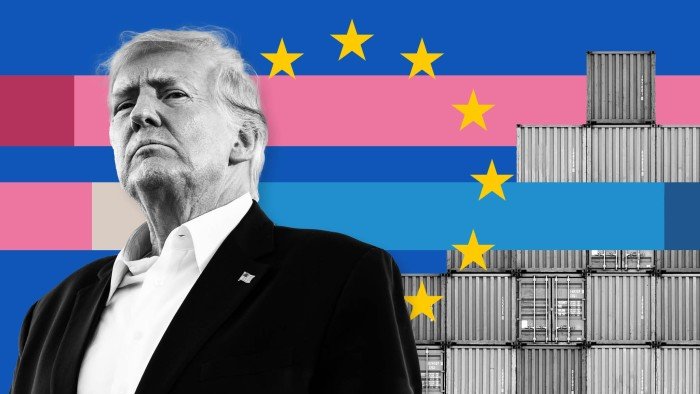A possible global trade war and regional political paralysis are the two biggest threats to the euro zone economy in 2025, according to a Financial Times survey of 72 economists.
US President-elect Donald Trump has promised to impose duties of up to 20 percent on all US imports, with tariffs on China rising to 60 percent once he returns to the White House on January 20.
If Trump keeps his word, the tariffs would mark the most significant surge in U.S. protectionism since the Great Depression era and raise the prospect of retaliation elsewhere.
The euro zone, which has a large trade surplus with the US, is seen as acutely exposed not only to higher tariffs but also to the risk of China selling cheap products on global markets in response to Trump’s measures.
“Trump’s second presidency represents the biggest political and economic risk right now,” said Mujtaba Rahman, managing director for Europe at analyst Eurasia Group. “Europe will face tariffs and Trump’s push to force a more aggressive decoupling from China.”
A Trade conflict A scenario triggered by US tariffs is almost taken for granted by economists surveyed by the FT: 69 percent of respondents think it is likely, while 68 percent warn that such a scenario poses the biggest threat to the region next year.
Almost all respondents – 81 percent – said a second Trump term would weigh on euro zone growth.
Economists say the impact of Trump’s trade policies is likely to hit manufacturing in Europe even before they are implemented. “The Expectations of Trump Tariffs. . . provide a strong incentive for companies to wait to invest until some of the uncertainty is resolved,” said Tomasz Wieladek of T Rowe Price.
On average, the 72 respondents expect this Eurozone economy only grow by 0.9 percent. That would be the third straight year of below-average growth, below the 1.1 percent that European Central Bank staff had forecast in December.
However, there is broad consensus that the single currency area can avoid a recession. John Llewellyn, a former senior economist at the OECD and Lehman Brothers who is now a partner at Independent Economics, is the biggest outlier.
Llewellyn predicted the euro zone economy would end next year one percent weaker than it started, saying: “Investors are currently unjustifiably complacent about what President Trump is likely to bring.”
“Economic stability is far more fragile than the modern generation realizes,” he said.
Most of the economists surveyed – 61 percent – support ECB President Christine Lagarde’s call for EU politicians to start trade negotiations with Trump to avoid a full-scale trade war.
“(The EU) may want to use the threat of retaliation as part of the negotiations. But ultimately tariffs are a self-inflicted injury and the EU would be better off not using them,” said Isabelle Mateos y Lago, chief economist at BNP Paribas.
Several economists point to the EU’s vast experience in trade negotiations and its position as one of the world’s largest trading blocs. “The EU is anything but in a weak position,” said Christian Dustmann, director of the Berlin-based economic think tank Rockwool Foundation.
But a vocal minority warned that seeking a trade deal with the US would only encourage more aggressive action. “Trump has the mentality of a playground bully,” said Kamil Kovar, senior economist at Moody’s.
Carsten Brzeski, global head of macro at ING Bank, said tariffs are not the only threat to the European economy posed by the US in 2024. “US tax cuts, deregulation and lower energy prices will also make the US economy more attractive compared to the Eurozone.”
In addition to geopolitical risks, Europe’s inability to solve its home-grown problems is seen as the main risk by almost a third of all respondents.
Ulrich Kater, chief economist at Germany’s Deka Bank, said Europe would soon resemble the “late Habsburg Empire.” It fell behind economically and technologically, became bogged down by bureaucracy and dominated by “melancholy memories of its former greatness.”
When asked about possible reasons for optimism, one in five cited falling interest rates and the hope of a revival in consumer demand.
A similar proportion of analysts believe that Germany’s early elections in February could lead to a change to the country’s strict constitutional debt brake and increased investment.
“The psychological depression in Germany could be reversed if a new coalition could present a coherent reform program and lift the debt brake,” said Moritz Kraemer from LBBW.
However, Marcel Fratzscher, director of the Berlin economic think tank DIW, was less optimistic. “Don’t expect a new German government to hit the ground running and provide a much-needed boost to confidence,” he said.
While the center-right Christian Democratic Union is expected to be the strongest party, coalition negotiations could be complex and drag on for months. In addition, CDU leader and top candidate Friedrich Merz has so far shown only limited appetite for changes to the debt brake.
Paradoxically, a fifth of all economists hope that the gloomy mood could turn into a blessing, as the situation could become so dire that Europe could eventually undertake the necessary reforms.
“A hostile international political climate represents an opportunity for European governance,” said Lena Komileva, chief economist at consultancy (g+)economics.
Kraemer from LBBW emphasized that expectations “are now so low overall that there is also potential for positive surprises.”
Additional reporting by Alexander Vladkov in Frankfurt
Data visualization by Martin Stabe








